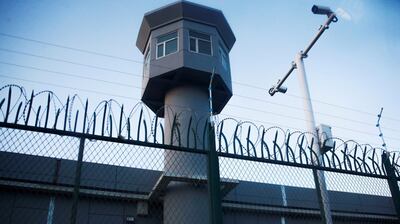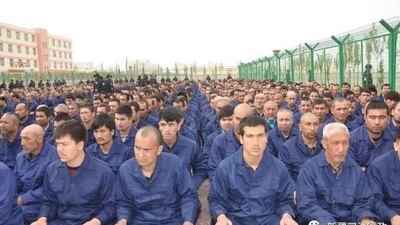The only way U.S. apparel brands and retailers can ensure they are not complicit in forced labor in China’s Xinjiang Uyghur Autonomous Region (XUAR) and are complying with U.S. law when they import apparel is to cut supply chain ties to the region, experts told a Washington hearing Wednesday.
Authorities in the XUAR are believed to have held up to 1.8 million Uyghurs and other Muslim minorities in a vast network of internment camps since early 2017. Under increasing international scrutiny, authorities in the region have begun to send detainees to work at factories as part of an effort to label the camps “vocational centers,” although those held in the facilities regularly toil under forced or coerced labor conditions.
Reports of abuses have led to the U.S. designating the situation in the region as genocide, following earlier legislation that allows for sanctions of officials and entities deemed responsible for oppressive policies there, including the forced labor scheme.
However, forced or coerced labor is so pervasive in the XUAR that many companies, including major international brands and retailers, are at a loss for how to completely disentangle themselves from the problem, even when they make a concerted effort to do so.
On Wednesday, the bipartisan United States Commission on International Religious Freedom (USCIRF), an independent federal government body, held a virtual hearing entitled “A Religious Minority Enslaved: Addressing the Complicity of U.S. Companies in Uyghur Forced Labor.”
During the hearing, U.S. Senator Marco Rubio, a co-chair of the Congressional Executive Commission on China (CECC) delivered prepared remarks, noting that well over half a million people were compelled to pick cotton in the region in 2018 through the forced labor scheme, and that the XUAR produces more than 20 percent of the world’s cotton.
But he warned that forced laborers are used to produce many other products, including tomatoes, hair products, apparel, consumer electronics, and even polysilicon used in solar panels.
“Let us be totally clear. There is no ability for companies to conduct business as usual in Xinjiang or where Chinese government programs have transported Uyghurs outside of the region,” said Rubio. He recently reintroduced legislation known as the Uyghur Forced Labor Prevention Act to the Senate to address the systematic use for Uyghur forced labor and ensure that U.S. companies are not complicit.
“Put another way, proper due diligence of their supply chains is just not possible. CCP (Chinese Communist Party) officials block it. As with so many issues, normal business practices do not prevail in China. The CCP refuses to play by the rules, and it ignores international norms.”
Rubio called for a strong and immediate response to China’s violations in the region and warned U.S. companies to “wake up to this reality.”
“Should they choose to continue doing business where they know they may be complicit in human rights abuses, including genocide, we must call it out and do everything we can to ensure they do not make unknowing consumers complicit in their actions,” he said.
Rubio’s Uyghur Forced Labor Prevention Act would create what is referred to as a “rebuttable presumption,” through which the onus is placed on companies to provide evidence that their goods coming from the XUAR or other Chinese government labor schemes for Uyghurs are not made with forced labor.

Existing mechanisms ‘meaningless’
Gary Bauer, a USCIRF commissioner, said that given the U.S. designation of the situation in the XUAR as constituting genocide and crimes against humanity, “no government or company should ever condone or enable such crimes—much less U.S. companies, whose supply chains in China very likely are tainted by Uyghur forced labor that the CCP approves and encourages.”
"U.S. companies operating in China must therefore not sit idly by intentionally ignoring the evidence and pretend that they can continue to conduct business as usual," he said.
Nury Turkel, a Uyghur-American lawyer who was appointed as a commissioner of USCIRF last year, noted that many U.S. and international companies continue to rely on third-party audits and inspections, assuming such measures are sufficient to clear them of any responsibility for forced labor in the region.
“Let me be clear: third-party audits alone cannot guarantee that there is no forced labor in these companies’ supply chains,” he said.
“Given the extremely repressive environment in the Uyghur region, in fact, third-party audits and inspections are often quite meaningless, as many minority workers simply cannot tell the truth about their circumstances for fear of retaliation.”
He applauded U.S. government moves to adopt the genocide label and curtail China’s coercive economic practices, including forced labor, and called on U.S. companies to follow suit “by stepping up and moving beyond their existing and insufficient supply chain due diligence measures.”

‘Urgent action’ needed
Scott Nova, executive director of the Worker Rights Consortium, a Washington-based labor advocacy group, pointed out that forced labor in the XUAR is a central component of the government’s policies in the region and links to abuses, including arbitrary detention, political indoctrination, family separation, torture, gender-based and sexual violence, and pervasive surveillance.
“U.S. companies must take urgent action to ensure that they are not complicit in these abuses, he said.
Nova said that due to the XUAR’s outsized role in the production of cotton, and China’s dominant role overall in the production of cotton fabric, there is a “substantial risk” that any element of billions of garments imported into the U.S. annually were made with forced labor.
Specifically, he said, of the more than 13 billion units of cotton garments imported into the U.S. by apparel brands and retailers in 2019, “roughly one in five” was made, in part, in the XUAR.
But he said that garments sewn in the XUAR for direct export to the U.S. “are the tip of the iceberg” relative to garments sewn outside the region but containing cotton or yarn from there.
“This means that the bulk of the Uyghur Region-related forced labor risk in the U.S. apparel market sits below the visible surface of the garment supply chain, creating serious challenges for the detection of Uyghur Region content,” he said.

Due diligence nearly impossible
Nova said that due diligence in the XUAR is nearly impossible because managers utilizing forced labor are not going to admit to auditors that workers are coerced, nor are they likely to maintain factory records that would demonstrate forced labor is taking place.
Additionally, he said, no auditor can claim that labor is being performed voluntarily unless they are able to interview workers candidly, and that such workers can speak without fear of retribution. In the XUAR, however, it is a certainty that workers who are coerced will face severe retribution if they are found to have spoken truthfully to inspectors about their employment, Nova said.
Meanwhile, a massive surveillance apparatus in the region ensures there is nowhere to interview workers outside of the workplace where they will feel safe from observation and Chinese authorities have enforced a ban on any form of civil society with any degree of independence from the Chinese state and CCP, further compromising the ability to hold factories accountable.
“The combination of the widespread risk of forced labor across farms and factories in the Uyghur Region, and the unavailability of viable due diligence mechanisms, leaves U.S. apparel brands and retailers with only one means to ensure that they are not complicit in forced labor and that they are complying with U.S. law when they import apparel,” he said.
“That option is to extricate their supply chains from the Uyghur Region.”

Forcible displacement
Last week, German researcher Adrian Zenz, who also spoke at Wednesday’s hearing, released a report which cited new evidence from Chinese sources as showing that the forced labor scheme not only serves economic purposes but is intended to “forcibly displace ethnic minority populations from their heartlands.”
It said that the system is aimed at “intentionally reducing … population density” in ethnic minority regions and cites several experts in international criminal law as saying that there are “credible grounds for concluding” that it meets the criteria for crimes against humanity.
Zenz, a senior fellow with the Washington-based Victims of Communism Memorial Foundation, reviewed numerous public and non-public Chinese government and academic sources that detailed what his report says is part of a “state-run scheme to forcibly uproot [minorities in the XUAR], assimilate them and reduce their population density.”
